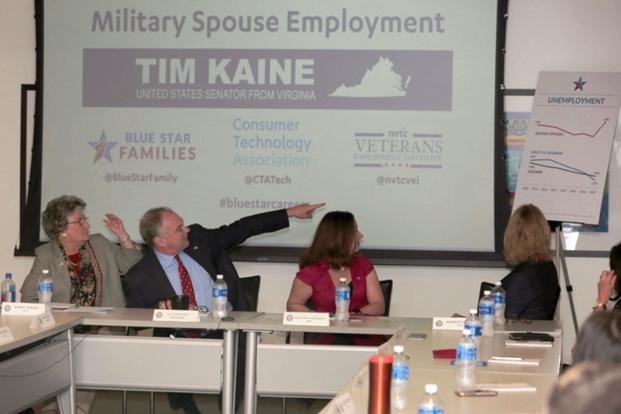A group of military spouses met with an influential U.S. senator Monday near Washington, D.C., to discuss ways to reduce the high level of unemployment in their community.
While the percentage of unemployed post-9/11 military veterans decreased from 10 percent in 2010 to less than 4 percent in 2017 -- a lower unemployment rate than the 4.4 percent in the civilian population -- the percentage of unemployed spouses actually increased from 26 percent to 28 percent during the same period, according to figures compiled by Blue Star Families.
Gathering around a table with Sen. Tim Kaine, a Democrat from Virginia and a member of the Senate Armed Services Committee, the spouses spoke of the challenges associated with trying to keep a job or land a new one as their husbands or wives advanced in their military careers.
With military families making frequent moves -- about once every two years -- the spouses said they often arrive at unfamiliar bases in remote areas in the U.S. or overseas facing a dearth of employment opportunities, inconsistent professional guidance, limited child care options and a complicated professional licensing process that can vary by state.
"What's available for a spouse varies from place to place," said Carmen Emborski, a military spouse and doctoral candidate in environmental toxicology and human health at Texas Tech University. "That's a big part of the problem."
Emborski, the wife of an Air Force officer and a mother added, "It's challenging to find a career that you can take with you."
She was among a handful of spouses who met with Kaine, Pentagon officials and business executives for the event, which was held at the Consumer Technology Association, a trade group in Arlington, Va., and organized by Blue Star Families, an advocacy group based in Encinitas, Calif.
"I think this started a good dialogue," the senator said afterward.
Kaine, whose son serves in the Marine Corps, said he heard a number of good suggestions during the event, such as adding a military family preference to the website www.usajobs.gov, expanding state reciprocity compacts that recognize common licensing standards, and creating an award or designation for companies and states who hire military spouses.
"It's not always about regulations and mandates -- sometimes it's merely about shining a positive spotlight on those that do it well," he told reporters.
When asked about his own legislative push to allow military spouses to transfer professional licenses and credentials across state lines, Kaine said, "We promote it, but as we heard, just because all 50 states have laws on the books doesn't mean that everybody enforcing the laws is paying attention to it and really making sure it happens."
Kaine, the second-highest ranking member of the committee's Readiness and Management Support Subcommittee, pledged to work with the National Governors Association on the licensing issue and with his colleague, Sen. Jim Inhofe, a Republican from Oklahoma and the panel's chairman, to schedule a hearing in Congress on the broader topic of military spouse unemployment.
Army Lt. Gen. Gwendolyn Bingham, assistant chief of staff for Installation Management, compared the employment of a spouse to the readiness of a soldier.
"I would not be where I am without my spouse," she said. "I see this as a readiness issue."
C. Eddy Mentzer, a military spouse who works at the Pentagon as associate director for family readiness and well-being in the Office of Military Family Readiness Policy, said more companies must develop employment programs designed to target military spouses, just like they do for military veterans.
"We have to move spouse employment out of the fine print," he said to applause.
Mentzer touted as a best practice a "train-to-move" program developed by a business operations company located on Fort Monroe in Hampton, Va., designed specifically for military spouses with the goal of keeping them employed even as they make a permanent change of station, or PCS.
Executives at companies ranging from Amazon.com Inc., the biggest online retailer, to CACI International Inc., a professional services and IT company, said they are working to hire more veterans and military spouses.
And the employment website Monster.com (which owns Military.com) plans to expand www.ustechvets.org, designed to accelerate veteran employment in the technology industry, to include more offerings for military spouses.
Kathy Roth-Douquet, chief executive officer of Blue Star Families, encouraged attendees to collaborate on potential fixes to the problem.
According to her organization's research, fewer than half, or 48 percent, of military spouse respondents were employed in 2016. Of those, about half, or 51 percent, earned less than $20,000 and more than a third, or 39 percent, earned less than $10,000.
"This solution is not in the hands of one person," she said. "We have to work together."
-- Brendan McGarry can be reached at brendan.mcgarry@military.com. Follow him on Twitter at @Brendan_McGarry.






























